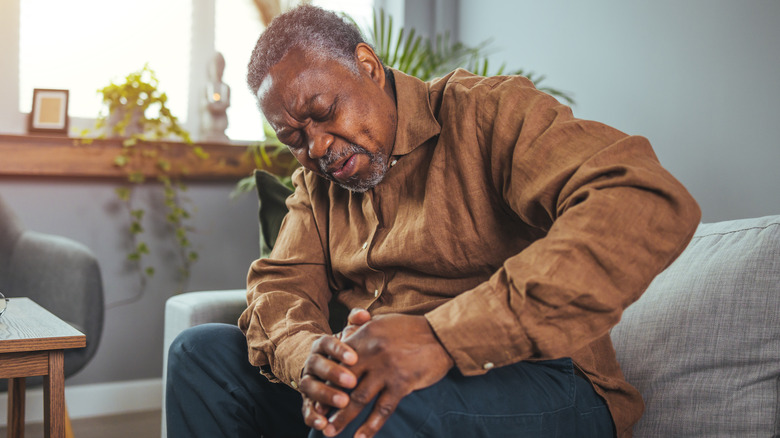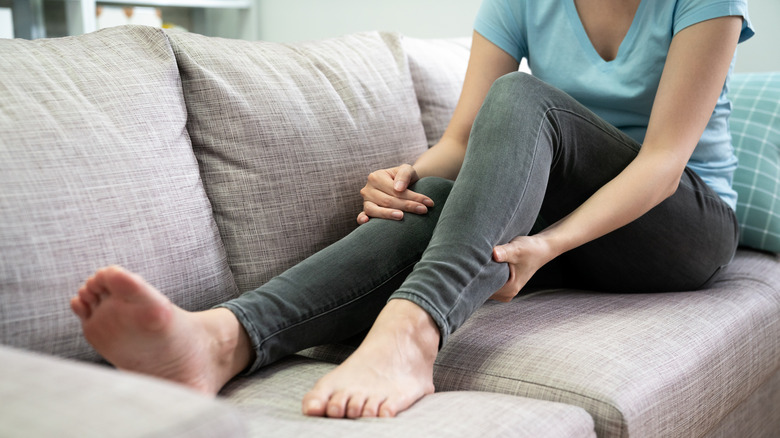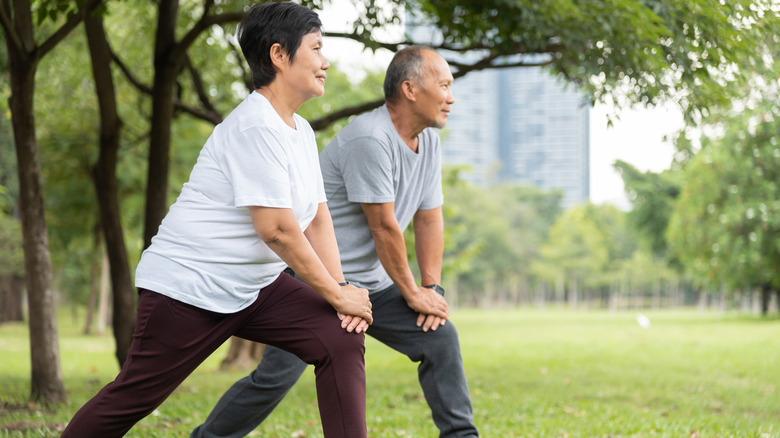Common Causes Of Stiff Knees After Sitting
Whether you've been rooted to a desk during a long day of work or standing up at the theater after a nearly 3-hour movie, you may experience what is sometimes referred to as movie-theater knee, according to Harvard Health Publishing. Characterized by pain or a dull aching sensation, movie-theater knee is the result of remaining stationary for an extended length of time.
Out of all the joints in our body, our knee joint is among those most primed for mobility (via Arrow Physical Therapy and Rehabilitation). However, it is also among those most prone to stiffness. Roughly one-quarter of adults are reported to experience ongoing knee pain, according to research published in the Annals of Internal Medicine. Time spent sitting is one contributing factor that can aggravate symptoms.
In some cases, the lack of activity itself may be what's behind your knee stiffness. Spending the majority of our days seated both tightens tissue and hinders blood flow in the body. The surrounding knee muscles may also lose strength over time, making bearing weight more challenging.
Possible health conditions related to stiff knees
In other instances, stiffness in the knees that strikes after time spent sitting down may be due to a health condition. One such condition is bursitis, in which the protective fluid-filled sacs within the knee joints become inflamed from excess use (via Arrow Physical Therapy and Rehabilitation). Another condition commonly associated with knee stiffness after sitting is osteoarthritis, characterized by the progressive wearing down of cartilage in the knees as we grow older.
However, knee stiffness is not only associated with the wearing down of the area. It can also stem from buildup in the area – specifically of scar tissue. When scar tissue accumulates around the joint, such as following a surgical procedure or trauma to the knee, it can potentially hinder our leg's mobility, leading to knee stiffness when standing up after sitting down. Also related to knee trauma, stiff knees can also occur as a result of injury, especially the tearing or over-stretching of one's ACL or a meniscus tear (per Border Therapy Services).
How to ease the discomfort of stiff knees
When it comes to alleviating the pain of stiff knees, stretching can go a long way. While physical activity is not advised for individuals healing from an injury, those with arthritis-related cases of knee stiffness may find certain exercises helpful. Stretches that target balance, muscle strengthening, or range of motion can be particularly beneficial (via Medical News Today). People with knee stiffness may also want to try exercises like leg lifts, hamstring curls, single-leg standing, or activities such as swimming and cycling, amongst others.
Alternatively, certain medications may be beneficial in helping relieve the discomfort of knee stiffness, such as over-the-counter (OTC) nonsteroidal anti-inflammatory drugs. In some cases, your doctor may advise prescription medications. Be sure to contact your physician if you experience pain or swelling alongside knee stiffness. The same is true in the event of an injury. Treatment methods often involve routinely applying a cold compress to the knee, resting the area, or wearing a stabilizing knee brace.



